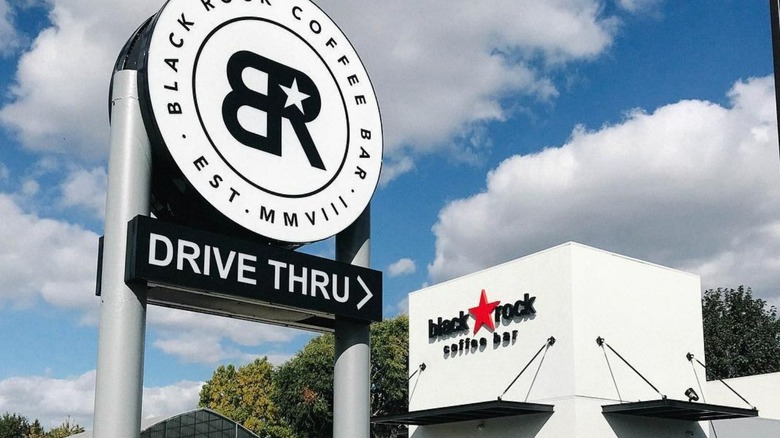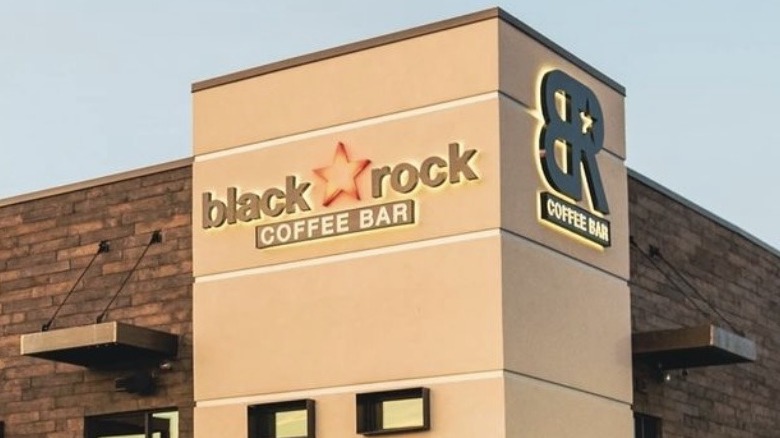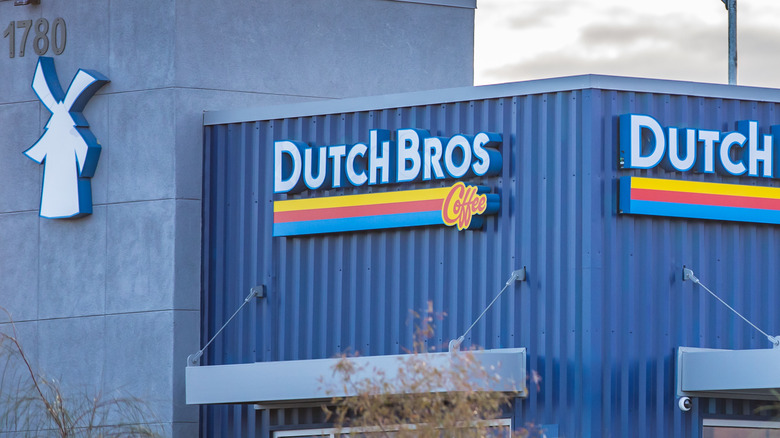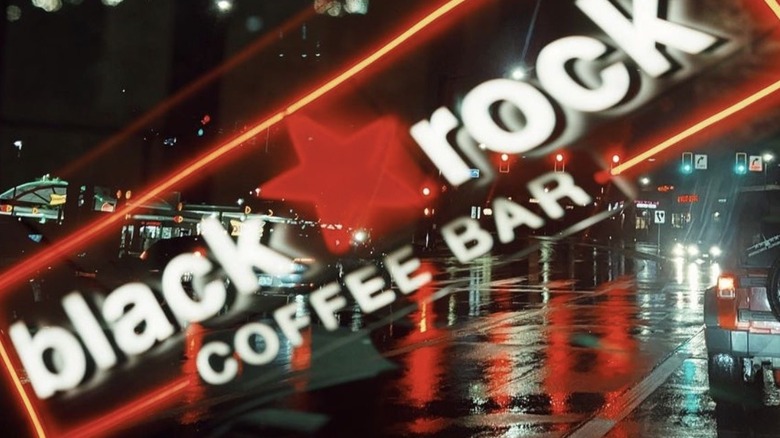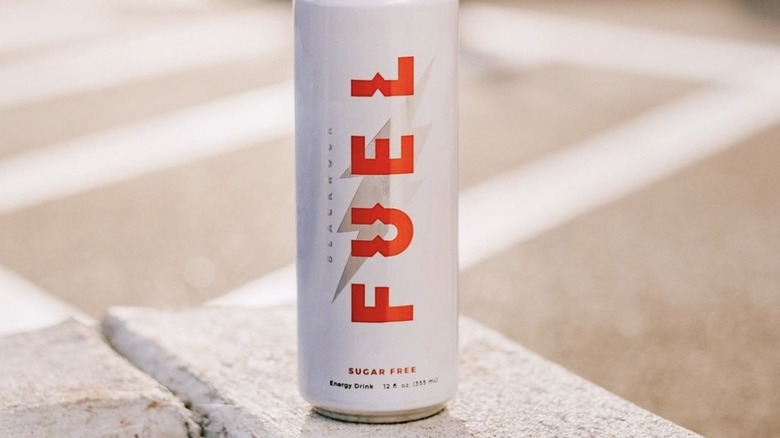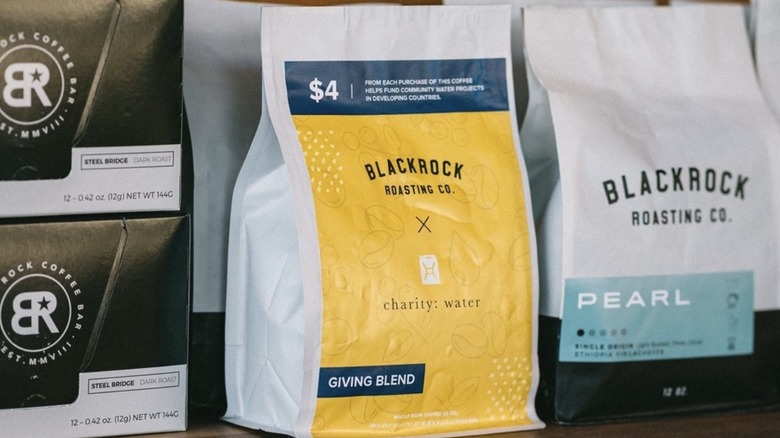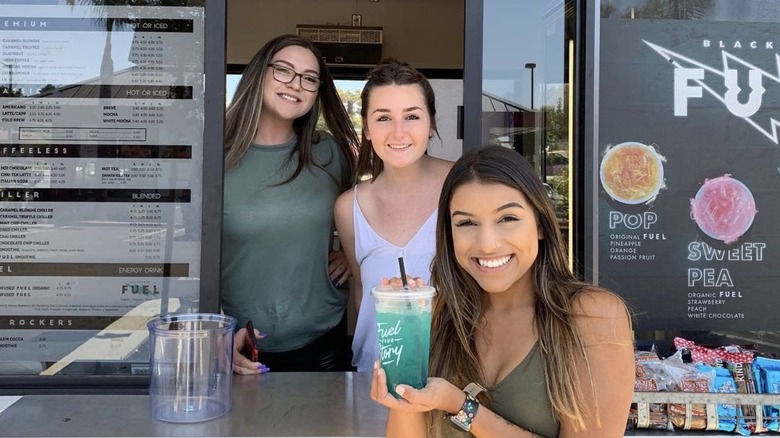The Untold Truth Of Black Rock Coffee Bar
Coffee, particularly coffee acquired conveniently in a big cup, packing a powerful punch of caffeine and maybe some sugary and creamy additions, is big business in the United States. Chains like Starbucks and Dunkin' Donuts are where millions of Americans get their much-needed morning infusion of hot brown re-charge fluid, but apart from the big cities and suburbs and East Coast enclaves dominated by those two chains, respectively, the popularity of drive-in coffee kiosks has exploded over the past decade or so.
Pioneered in the Pacific Northwest by The Human Bean and Dutch Bros., modest, minimalist buildings offering a full menu of coffee drinks and adjacent beverages have spread across the United States, popular for their offerings as much for the convenience of not making commuters even get out of their cars. There's one more particularly aggressive and attractive player in the drive-up caffeine game, and that's Black Rock Coffee Bar. With around 80 locations in the western United States, Black Rock has proven a formidable competitor to Big Coffee. Here's everything you need to know about this beanery on the rise.
Black Rock Coffee Bar is a (multiple) family business
While Black Rock Coffee Bar has made big gains throughout the American West in just a decade and change after its creation, it originated as a family business, albeit one involving many families, and it still is. Along with Ryan Hagler and his father, John Hagler, initial principals in the company included Daniel Brand and Jeremy Brand. Before creating Black Rock in northern Oregon in 2008, the brothers helped run Oregon Mountain Coffee Co., a strip mall café in southern Oregon owned by relatives, according to The Bend Bulletin.
Daniel Brand went on to oversee company operations for Black Rock while another business partner, Jeff Hernandez, stepped up to serve as CEO, although he primarily focuses on scouting out new kiosk locations and store openings. He also grew up around a southern Oregon business — his father, Rob (also a part of the Black Rock start-up crew) ran a construction company. The younger Hernandez didn't want to follow his father into the family business, so he went into coffee instead.
Black Rock Coffee Bar is the anti-Dutch Bros. and the anti-Starbucks, too
The Portland, Oregon-based Black Rock Coffee Bar is one of many chains competing for the caffeine dollar of Pacific Northwest residents, where coffee has long been a major part of the general culture. Dutch Bros., founded in Grants Pass, Oregon, in 1992, rapidly developed throughout the region, pioneering the business model of standalone, drive-through coffee stands placed in parking lots or small parcels of land — about the size and footprint of an '80s-era film developing kiosk. By 2008, according to QSR Magazine, 139 Dutch Bros. had opened in Oregon, Washington, California, Idaho, Colorado, Arizona, and Nevada. That same year, Black Rock Coffee Bar debuted its first stand in the Portland suburb of Aloha, and as of 2021, the chain consisted of about 80 locations in ... Oregon, Washington, California, Idaho, Colorado, Arizona, and Texas — almost the same territory as Dutch Bros.
That's no accident. According to The Bend Bulletin, the company's founders explicitly set out to take a bite out of Dutch Bros.' market share. But then, as ambition grew along with the business, executives set their sights higher and now considers itself a rival of coffee industry leader Starbucks while also offering a different sensibility. "Starbucks can sometimes feel like jazz," CEO Jeff Hernandez said. "Dutch Bros. is Sublime. We almost kind of try to be that Top 40 vibe. It's more than ambiance, the type of music that's played, the type of atmosphere."
What's in a name? For Black Rock Coffee Bar, nothing at all
It's a bit of an understatement, but there's a lot to do when a person decides to open a new business, especially one they hope to quickly expand or franchise. A supply chain is established, executive and field employees are hired, locations secured, stores built, and a name is selected. Finding the right name for a business can be tricky. It's a choice that can involve extensive and careful market research in order to find a moniker that expresses the business's sensibility, resonates with customers, isn't taken by a potential competitor, and just plain sounds good. When it came time to naming Black Rock Coffee Bar, the company's founders took an extremely informal and non-traditional approach, seeking a name that explicitly lacked importance, at least at first. "We wanted to come up with a name that didn't have much meaning," Black Rock CEO Jeff Hernandez told The Bend Bulletin. "If it did grow, we would be able to give it meaning."
Hernandez and his associates decided on "Black Rock" by brainstorming a list of ideas, which numbered eight possibilities. Then they wrote them on a piece of paper and would go out to dinner and ask their servers — food service industry professionals, after all —which one they liked best. "Eight out of ten picked Black Rock," Hernandez said. "There's so many black rocks. It's fairly generic."
Black Rock Coffee Bar invented a drink which it used as the basis for a new line of drinks
Plenty of American coffee outlets big and small, and for decades have offered Italian sodas on their menus. An alternative to coffee for customers who don't like coffee or crave the jolt it provides, they're made from carbonated water, a sweet and flavored syrup, and maybe some cream. Black Rock Coffee Bar is among the coffee chains that serves Italian sodas, or at least an innovative, in-house derivative that tastes like the beverage but also offering the powerful kick of caffeine. Black Rock's marketing slogan is "Fuel your story," and Fuel is also the name for its store brand of energy drinks. According to Structure, Black Rock developed the recipe internally, as a way to save money on supplies for its cold beverages — energy drinks with the addition of flavored syrups and served on ice or blended with milk.
In March 2019, Black Rock Coffee Bar debuted Fuel drinks chain-wide in three flavors: Original, Organic, and Sugar-Free, and it's the base product in two menu items, Infused Fuel and the Fuel Smoothie. Eventually, the company hopes to use Fuel to expand the Black Rock brand into grocery and convenience stores.
Black Rock Coffee Bar is very particular about its beans
Because Black Rock Coffee Bar is still a relatively moderately-sized, regional company, it can still operate like a small business. And in the world of coffee, that means maintaining rich, tasty beverages that come from properly roasted coffee beans, a standard the company tries to maintain by utilizing small batch roasting. According to the Black Rock Instagram account (via Pinterest), avoiding large-scale roasting makes for a superior, fresher product.
And unlike other, bigger coffee companies, Black Rock Coffee Bar keeps its selection of beans for sale very limited. The chain does sell its own beans, but only about six varieties — four named after neighborhoods and famous structures around its founding town of Portland, Oregon, plus a special "Giving Blend" from which $4 of every bag sold goes to building wells in the developing world. To keep revenues from all its beans coming in, Black Rock employs a novel, online automated subscription method. Customers pick their blend, if they want it ground or whole, and how often and when they want it delivered.
Many Black Rock Coffee Bar stands are owned by former baristas
Within a decade of opening its first store, according to 7Shifts, Black Rock Coffee Bar had grown to more than 40 locations, and just five years after that, the company doubled in size. For a company to spread that quickly, they've got to have a business or franchise model that's both easy to duplicate and attractive to investors. Black Rock does, and the way they've franchised aggressively is by promoting from within. The company utilizes what it calls an employee franchise program.
People who have worked inside a Black Rock Coffee kiosk, pulling espresso shots and mixing smoothies, are given the opportunity to invest in, co-own, and operate a new Black Rock Coffee kiosk. The employee finds an outside investor to partner with, and together they receive 51 percent ownership of the new stand (with Black Rock controlling a minority stake). Because they already know the company's day-to-day practices, business operations, and culture, opening a new branch is that much easier. One of the earliest Black Rock locations, store #33 in the Portland suburb of Troutdale, is owned and operated by a former Black Rock coffee jockey.
